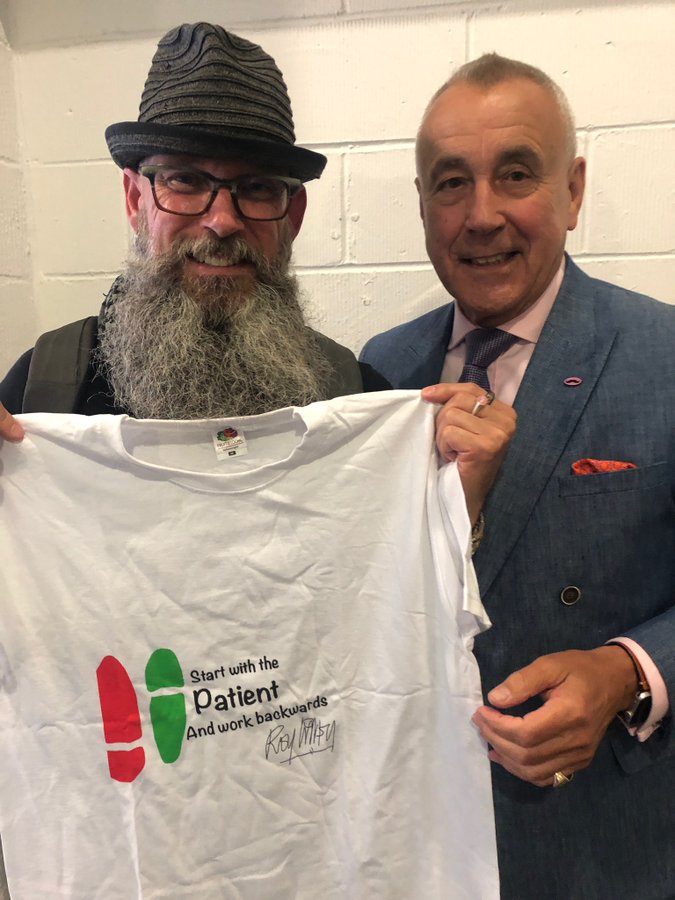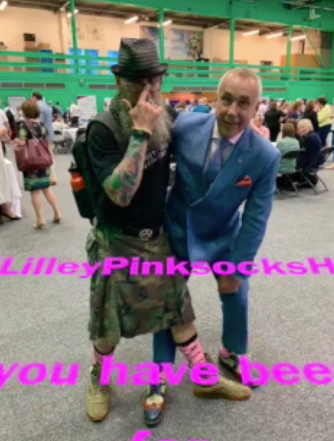
Roy and Prof after the cha
If you want to see the health chat ‘As Live’ – you can view it free in two sections
Well. My only concern was if Prof Shafi Ahmed, entrepreneurial, people centred, out at the edge of things, surgeon was aiming to take volunteers from the audience!
As ever, Roy Lilley really wants to know what made the chatee who they are. Started nicely. “So your dad was a freedom fighter and hero?”
Well, yes. UK Merchant Navy when hailing from East Pakistan. Later, joined freedom fighters in what East Pakistan became – Bangladesh. It’s now doing really well. 160 to 200 million people. Loads of manufacturing especially in fashion wear. You can see that the environment creates the person.
His education started in Technical College…not the usual route? Why medicine then? Well, his mum brought the three kids to have an adult, Asian conversation. “One of you needs to be a doctor, one a lawyer and one an engineer. That’s all I’m saying. It’s up to you who takes which”. Eldest brother took Engineer. Sister (next in age hierarchy) wanted law. And is now a judge. So he was left with Medicine. Embraced it though. Knew from 17 years old that is what he wanted. He wanted to help people in the emotional sense. Described surgery as easy. He loves the sense of reward in his job. “It is very grounding and a great leveller as every day there are complications. It’s very transparent. And it makes you humbler.”
It’s a team game in his eyes. Shafi told us the story of having a team bonding 30 minutes eased into the schedule to help the everyone communicate and feel involved. Posh bone china cups and tea, naturally. The powers that be stopped it…even before the CQC existed!
Then we got onto the tech and the minimally invasive stuff. All that keyhole malarkey. Great advantages of course. Less disease recurrence. Safe. Smaller scars. Quicker – so quicker recovery. Less pain. But would you go first? Someone had to – and after a bit of Maverick episodes, it is now more standardised and most common form of intervention.
As it’s quicker and people get home earlier – could it help reduce the 4.4m on the waiting lists?
Well, it is not that simple of course. We still need trained docs and other health care professionals in the team. And we have to be more flexible – work life balance is often an afterthought in many Trusts and other parts of the NHS, in my view.
This is where the futurist surgeon proved to be a futurist thinker too. The 100 hour weeks that junior doctors used to be obliged to think of as a way of accelerating training is now history. It wasn’t safe. Now, more support happens and consultants are available to support their teams, real time. But the 100 hour weeks at least meant 36 000 hours of experience. Now, although more structured, the average from starting your specialism as a Registrar is only 6000 hours. Is it worse or better? Perhaps the CQC could tell us (sorry Roy!). Change to me often means the pendulum swings too far the wrong way – and this may be true of the 6000 hours? Shafi talked about Generation Z – the 18 year olds joining the job market or training or continuing education.. “We need to rethink the whole model. OK – we don’t have enough people in the system. What if we had a 5 day week with 2.5 days on the job learning to be a surgeon, and 2.5 days to be an internal entrepreneur. I had 500 applicants in one day…”. Turned on its head thinking. New jobs suitable for tomorrow, today. Wow. How good is that?

The tech in action…
Medical students? Does the training have to be 5 years? Milton Keynes University Hospital manages in 4 1/2. Why not 4? 30 % of medical students leave during their training. What a waste of time and resource. And we really need lots more people, or we will never get the basics right. Otherwise the 4.4 m on the waiting lists will just grow.
Prof Shafi also joked that to become a Colorectal surgeon, “you need a good sense of tumour, and be able to follow your gut-feel”. Joking apart, he finds his work humbling. He loves his cancer patients. But they wouldn’t be as well served without the input of the whole team. Experts at all levels in the team. Fab…
We moved onto the tech. Started with Google Glass (Glasses that enable you to transmit what you are seeing – like an operation…) – driven by wanting to make his training input to be more than diffusion osmosis. It was like having a mobile phone on your head. He tried it out by recording an operation first. Students assessed this, and then it went live day two. People who wanted to learn tuned in from 114 countries. The technology was his enabler.

OK – we all know that Shafi is an innovator and educational entrepreneur. The other tech like A.I. and Virtual Reality just seemed amazing. But he has to work in a risk averse organisation and in a world that erects barriers more quickly than it gets excited. There is too much self protection and preservation driving the arguments. One thing is for certain. Prof Shafi Ahmed will continue to look forward, never backwards.
You can’t fix the past. You can only use that experience to fix the future. And that’s what we had a glimpse of at this Health Chat.
If you want to view it click on these two sections:
 First Health Chat of 2020. Anyone who makes the link to “this provides us with 2020 vision” needs to get a life.
First Health Chat of 2020. Anyone who makes the link to “this provides us with 2020 vision” needs to get a life.









